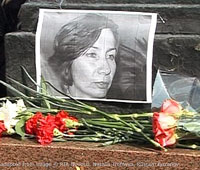After three years human rights activist Estemirova killing remains unsolved
Interfax - 7.13.12 - JRL 2012-127
Investigators probing the killing of human rights campaigner and activist of the Memorial human rights organization Natalya Estemirova, are following up on a new lead in the investigation - Estemirova's killing by someone from law enforcement agencies, Memorial Chairman Alexander Cherkasov has announced.

"Over the year, investigators have done a certain amount of work and they are conducting genotype identification procedures in relation to officers of a district police department in Chechnya as they are working on this lead. But we do not know how far they have progressed," Cherkasov said at a news conference at Interfax on Friday. "So, the theory constructed earlier has been disavowed," he said. "Someone had put a pistol in the militants' arsenal, which was then used to kill Estemirova, and drove the car with a pistol silencer into a garage. Many traces have remained that are leading, if not to the murderers, then to those who had built the fake theory," Cherkasov said. However, the killing remains unsolved to this day, he added.
July 15 marks three years since Estemirova was killed. She was a rights campaigner in the North Caucasus, and was a friend to Novaya Gazeta reporter Anna Politkovskaya, killed in Moscow on October 7, 2006, and lawyer Stanislav Markelov killed in Moscow in spring 2009. Memorial is Russia's leading non-governmental organization monitoring the observance of human rights in the North Caucasus.
Following Estemirova's killing, Memorial suspended its work in Chechnya, and its chief, Oleg Orlov, was prosecuted after he claimed that Chechnya head Ramzan Kadyrov was involved in the murder. Media reports said then, citing law enforcement services, that militant Alkhazur Bashayev was the main suspect in this murder case. In September 2010, Russian Investigative Committee chief Alexander Bastrykin said that law enforcement agencies have made serious progress in the Estemirova probe.
Estemirova's colleagues rejected those claims, however, saying that, "all theories where Bashayev figures one way or another seem partially feigned and partially far-fetched to us. The evidence and motives cited sound very unconvincing," Cherkasov told Interfax then.
Keywords: Russia, Assassinations, Beatings, Prison Deaths - Russian News - Russia
Investigators probing the killing of human rights campaigner and activist of the Memorial human rights organization Natalya Estemirova, are following up on a new lead in the investigation - Estemirova's killing by someone from law enforcement agencies, Memorial Chairman Alexander Cherkasov has announced.

"Over the year, investigators have done a certain amount of work and they are conducting genotype identification procedures in relation to officers of a district police department in Chechnya as they are working on this lead. But we do not know how far they have progressed," Cherkasov said at a news conference at Interfax on Friday. "So, the theory constructed earlier has been disavowed," he said. "Someone had put a pistol in the militants' arsenal, which was then used to kill Estemirova, and drove the car with a pistol silencer into a garage. Many traces have remained that are leading, if not to the murderers, then to those who had built the fake theory," Cherkasov said. However, the killing remains unsolved to this day, he added.
July 15 marks three years since Estemirova was killed. She was a rights campaigner in the North Caucasus, and was a friend to Novaya Gazeta reporter Anna Politkovskaya, killed in Moscow on October 7, 2006, and lawyer Stanislav Markelov killed in Moscow in spring 2009. Memorial is Russia's leading non-governmental organization monitoring the observance of human rights in the North Caucasus.
Following Estemirova's killing, Memorial suspended its work in Chechnya, and its chief, Oleg Orlov, was prosecuted after he claimed that Chechnya head Ramzan Kadyrov was involved in the murder. Media reports said then, citing law enforcement services, that militant Alkhazur Bashayev was the main suspect in this murder case. In September 2010, Russian Investigative Committee chief Alexander Bastrykin said that law enforcement agencies have made serious progress in the Estemirova probe.
Estemirova's colleagues rejected those claims, however, saying that, "all theories where Bashayev figures one way or another seem partially feigned and partially far-fetched to us. The evidence and motives cited sound very unconvincing," Cherkasov told Interfax then.